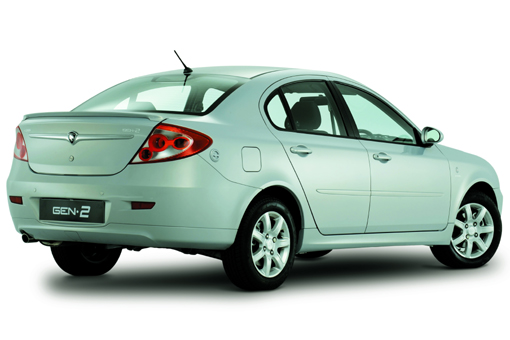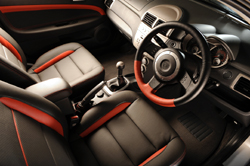Proton Gen-2 Ecologic
Humberside’s police force have been running LPG cars for 15 years. Is it time for you to convert? Frederic Manby looks at a Proton LPG conversion and gives his views.
GAS-POWERED vehicles are common in mainland Europe, but not so in Britain.
The fuel, liquid petroleum gas (LPG) is cheaper at the pumps, gives substantially more miles for your money and runs more cleanly.
The vehicle retains its petrol tank, so if you can’t find LPG on sale, the engine reverts automatically to petrol.
It is commonly used in mainland Europe, where it sells for half the price of petrol.
What’s not to like? The major deterrent is the conversion cost, as high as £2,000.
LPG pumps are not as numerous as petrol or diesel pumps. The LPG tank takes up space in the vehicle. It also adds weight.
You can not take an LPG vehicle through the Channel Tunnel or in many long road tunnels in Europe because of safety fears – denied by the LPG industry.
Humberside Police has been running LPG cars for 15 years, attracted by lower emissions and cheaper mileage.
At one time, it had more than 300 LPG-fuelled Protons on its fleet. Proton says the savings were “over £300,000” a year.
Humberside Police now has 210 LPG Protons but was not able to say how much money they saved.
“These vehicles have helped us to make savings in terms of fuel and running costs, although we cannot be specific about an actual figure”, said a spokeswoman.
Humberside also runs a mixed fleet of other LPG vehicles which include vans.
Proton has a head start for the driver who wants LPG, offering its Gen 2 models ready converted and at the same price as a petrol-only model.
Protons are already cheap. The LPG Ecologic model sells as a five-door hatch or four-door saloon, at £9,995 and £10,795 respectively.
My test car was the saloon, in black, and known as the Persona, which sounds like something to do with personal hygiene.
The only reason I can see to buy the Proton saloon is apparent value for money and the free LPG system.
You may not get the maximum savings but it will be cheaper to run than petrol or diesel because the LPG costs less.
You do not get quite the same miles per litre as with petrol but the fall-off in performance is negligible.
For example, my test car was not as smooth when pulling away at low speed in, say, third gear.
The motor is far from sweet anyway. It often sounds coarse and the five-speed gearshift is notchy and not pleasant.
Proton suggests a saving of about 40 per cent, or £500 a year, based on 10,000 miles. This is an optimum figure and the latest highefficiency petrol engines from makers such as Volkswagen, reduce the advantage of LPG power.
However, the LPG tank, plus the original petrol tank, gives you a longer range between fuel stops.
Regarding the safety of LPG tanks, Proton maintains that they are stronger than a petrol tank and, therefore, more resistant to impact damage. (However, if a gas tank does explode in, say, a fire, the outcome could be dire).
There are plenty of LPG filling points but these are often on industrial estates, which will be closed when conventional fuel stations are still open.
There is no point having an LPG vehicle if you have to go far out of your way to buy it.
Companies with a fleet of LPG vehicles are likely to have their own LPG bulk tank on site.
So much for LPG, but what about the Proton?Well, the hatchback is arguably better looking.
The saloon just about passed muster in black with alloys. Proton owns Lotus and promotes the “ride and handling by Lotus”. Hmm.
My test car wallowed badly at the back on corners, kind of sloppy and even at modest changes of direction one sensed the extra weight of the LPG tank and contents – about an additional 100kg over the back wheels.
Steer abruptly and the car sways.
The interior is roomy, with fold-down rear seats but is kin to the decor in a cheap boarding house with velour and low-grade plastic finishes and a dated housing for the passenger chest airbag.
The Blaupunkt radio controls are small, fiddly and exacerbated the worst reception I have encountered in decades of motoring.
The whole package reeks of fairly boring utility. Even the boot lid was heavy and hard to shut.
It is no fun to drive, but then you do get all this for £10,795 (hatch £9,995) which makes the much more exciting flurry of small Eurohatches look darned expensive.
Overall? Unexciting but presents a case for economical motoring at a reasonable purchase price.
Its economy is based solely on the lower price of LPG. If that were to rise in price, then the savings will be lower.
However, LPG (propane and butane as used for domestic heating/cooking) is a by-product of oil refining. Proton says there is so much in Britain that half is exported.
More propane is needed in the mix in winter to avoid freezing (the red Calor Gas bottles you see are propane) and this reduces the energy and the economy.
• This report has appeared in the Yorkshire Post


